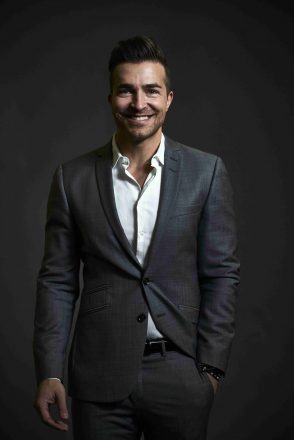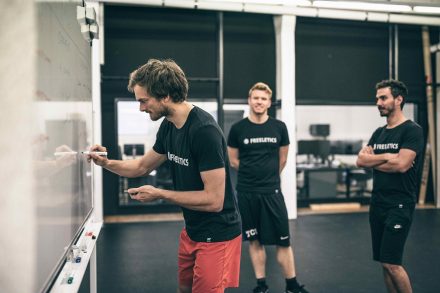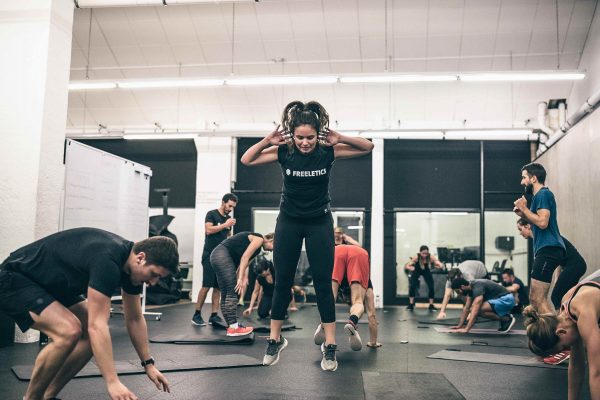The fittech startup Freeletics is one of the world’s fastest growing digital fitness companies. The company was founded in 2013 and is from Munich – which is not only a little-known fact among its 39 million users around the globe but also within the startup scene.
The company was originally registered as a UG (Unternehmergesellschaft, an entrepreneurial company with limited liability) by Andrej Matijczak, Mehmet Yilmaz and Joshua Cornelius under the address Heßstraße 89 at the Strascheg Center for Entrepreneurship at the university. About six months later, Daniel Sobhani joined the team as the CEO after working for the Boston Consulting Group. Daniel was born and raised in Munich, knew the three founders from college and had studied Business Administration, Mechanical Engineering, Finance and Technology Management in cities such as Munich and Sydney.
Worldwide workouts
With AI-based, hyper-personalized digital fitness coaching, Freeletics has turned the fitness industry, which had been dominated by brick-and-mortar fitness studios and exclusive personal trainers, upside down since its founding. Users connect with an app to participate in joint training as well as short, high-impact workouts to build strength, stamina and muscular endurance. It can be used no matter where you are, and you often just need your own body weight. The Munich startup’s vision was to support people around the world in realizing their full physical and mental potential and becoming the greatest versions of themselves.
How Freeletics went from bootstrapping to 45 million dollars of funding
Freeletics was still a small, young company back in 2014, but it had to cope with rapid growth even then. The new company moved around the corner in 2015 from the Munich University of Applied Sciences into an old factory building on Lothstraße. That is where more than 150 employees from nearly 40 countries now work and coach.

Daniel Sobhani played a major role in leading the team to its international success within such a short time – and did so as a company that was bootstrapping. Then in summer 2018, the three founders left the company. Shortly thereafter, the biggest milestone in the company’s history was reached: a 45 million US dollar round of Series A financing from the American investors Fitlab, Causeway, Media Partners and Jazz Venture Partners. What has changed since then? We were curious and wanted to learn more, so we interviewed Daniel Sobhani.
A peek behind the scenes: Interview with Freeletics CEO Daniel Sobhani
Munich Startup: Daniel, until mid-2018, Freeletics had bootstrapped. When the three founders sold their shares in the middle of 2018, you remained loyal to Freeletics. What prompted you to make that decision?
Daniel Sobhani: The three Freeletics founders had already withdrawn from operational business in 2014. Even though I obviously made decisions in close collaboration with the founders, all three of whom were still on the board, until their exit last year, I had been the CEO since 2014. The company and our vision has been dear to my heart since the very beginning.
In my opinion, the greatest part of Freeletics’ success and vision are still ahead. In operational terms, not much has changed except that I’ve been coordinating with our investors on the board since 2018. It’s an exciting time that is not only taking Freeletics to the next level as a company but also me as an individual. With Freeletics, our ambitious goal is to help people become “the greatest version of themselves.” Freeletics wants to help people all over the world – holistically and over the long term. I follow the same goal personally.

Munich Startup: After the founders’ exit, a Series A round of financing amounting to 45 million US dollars followed in December 2018. How did it feel to receive such a major injection of capital after bootstrapping for so long?
Daniel: The Series A financing was obviously good for us. We were able to immediately broaden and improve our positioning on multiple levels. The additional capital allows for longer term planning, more expertise, experience and resources and constant improvement of our AI-based coaches. It’s great to see the team, our products and our vision continue to develop and to grow globally and become successful in an increasing number of countries.
“Investors don’t just give money. They’re part of the company now.”
Munich Startup: Do you have a good tip for other CEOs for the first phase after completing a round of financing? What should they pay attention to?
Daniel: I think it’s important to explicitly welcome the board and investor management teams. That also means investing enough time in establishing personal relationships and the common goal for the company and visions for the future. Investors don’t just give money. They’re part of the company now. Realizing and utilizing that can be extremely helpful. It’s also important to still be prudent in how you use the capital. You should always keep that in the back of your mind.
Munich Startup: What is the most challenging topic for Freeletics at the moment?
Daniel: Our major goal is to help people with AI-based digital fitness, revolutionize the market and offer a functioning product for a “holistic fitness lifestyle.” That requires us to continue to develop, appeal to broader target groups and create new training plans for specific user groups.

Munich Startup: What areas are you currently focusing on in terms of corporate development?
Daniel: The future for us is all about the keyword I just mentioned: “holistic fitness lifestyle.” In the past, the fitness industry has often concentrated on how to build as much muscle as quickly as possible or how to get the perfect “beach body.” Those kinds of goals are short term and quickly end in disappointment.
We want to support a long term shift in lifestyle. Continuous training, a healthy diet, regeneration, sleep and awareness — we think it’s all interconnected. And we’re currently trying to implement the concept in all areas of the company as successfully as possible. An example is the integration of running in our app. In the past, we always had a separate Freeletics running app. This has now been integrated into the Freeletics app since August 2019. Combining that in an app makes our product more variable and integrative. And we want to push ahead with that strategy.
A focus on global growth and a holistic approach
Munich Startup: Has the spirit of the company changed now that investors are on board? And how have you reorganized the company?
Daniel: Very little has changed in operational terms. I’ve been head of the company as the CEO since 2014 and now coordinate with our investors on the board. Our company values have remained the same and are still clearly communicated within the company – which is even more important when you’re growing so quickly as a company and team. The spirit of the team, which has always been very strong, also hasn’t changed since the investment. We are, however, concentrating more on growing globally at the moment. The US market is important to us right now. Although we’re growing rapidly everywhere, the US is still the market with our strongest new customer growth despite the competition. The contacts and expertise of our American investors obviously help us as well.
Munich Startup: How are you positioned internationally and what further plans do you have for internationalization?
Daniel: I would argue that we have one of Munich’s most international teams at Freeletics. We have about 150 employees from 37 countries, the majority of whom work together in our headquarters here and provide ideas and inspiration from their home countries and cultures. In marketing in particular, we’re efficiently working on using various channels to appeal to different people from around the world with varied content. We’re focusing on new markets where we’re growing quickly but still have plenty of potential, such as the US or Asia.

Does Germany need to be careful to not loose its innovative and competitive potential?
Munich Startup: From an international level back to a local one: What is special about the Munich founder scene to you on a personal level?
Daniel: I view the Munich startup scene as very focused and efficient. There aren’t a lot of distractions and people communicate very well. In general, I would say the Munich startup scene “is getting things done.”
Munich Startup: And how do you gauge the startup atmosphere in Germany?
Daniel: I think the atmosphere is rather cautious. The “hip” image surrounding startups unfortunately doesn’t reflect the actual situation, which is one with a lack of capital and willingness to take risks. The legal conditions in Germany are also still far from being ideal. That scares off potential founders and investors and hampers international competitiveness. While there are good reasons for that, we still need to be careful to not loose our innovative and competitive potential over the long term.
Munich Startup: Thank you for the interesting insights, Daniel!



